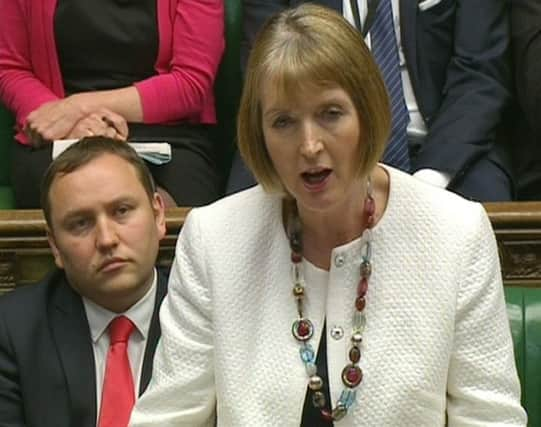Labour deeply divided as welfare reform bill passes


A second reading of the plans, which include limiting tax credits to no more than two children and a further reduction in the benefit cap, took place last night.
Following impassioned speeches by both ministers and the opposition, the bill passed by 308 votes to 124.
Advertisement
Hide AdAdvertisement
Hide AdThe vote highlighted divisions within the ranks of Labour’s 256 MPs as many abstained. Of the current Labour leadership candidates only Jeremy Corbyn voted against. He was among 48 Labour MPs to vote against the bill.
Mr Corbyn’s rivals in the Labour race – Yvette Cooper, Andy Burnham and Liz Kendall – all opted to abstain. Mr Corbyn told the Commons that the proposed law would make even bigger holes in the welfare state and drive people into poverty.
Labour enters the summer recess deeply divided over how to tackle welfare reform despite a last-ditch effort to pull the party together by acting leader Harriet Harman.
With the leadership race entering its final weeks, Labour MPs failed to agree on how to approach the Tory government’s Welfare Reform and Work Bill which had a crunch vote last night.
The bill will bring in a new living wage of £7.20 rising to above £9 in 2020, but take £9 billion out of working tax credits along with £3bn of other welfare cuts.
After facing a barrage of criticism over her calls for Labour MPs to support the bill at second reading, Ms Harman last night agreed to a compromise suggested by leadership front-runner Andy Burnham to put down an amendment which would have killed the bill if it succeeded.
She also dropped support for limiting working tax credits to two children from a list of measures in the Tory bill which Labour backs despite saying last week the party should accept the change.
The move saw Tory Work and Pensions Secretary Iain Duncan Smith press shadow work and pensions secretary Stephen Timms on the issue as he tried to capitalise on Labour’s splits and accused them of being “addicted to debt”.
Advertisement
Hide AdAdvertisement
Hide AdMr Timms said Labour would table amendments to deal with “unfairness” in the measures.
Despite the compromise Ms Harman insisted Labour MPs should abstain on the main vote and oppose specific measures when it is brought before a committee in the autumn.
However, her demands were criticised by many Labour MPs who signalled they intended to vote against the bill, with the SNP also making it clear it would oppose it.
Labour backbencher Helen Goodman, a key backer of leadership contender Yvette Cooper, insisted the party should be voting against the legislation rather than abstaining.
“Having pointed out what is wrong with the bill, it seems to me only logical, if her motion doesn’t succeed – which it is unlikely to do – that we vote against the bill in its entirety,” she said.
Welsh MP Huw Irranca-Davies also said he would oppose the bill.
Leftwinger Jeremy Corbyn, who many think could win the leadership race, made it clear he will vote against the bill.
In a bid to shore up support for Ms Harman, Labour veteran Frank Field, chairman of the work and pensions committee, attacked the government for “hurting three million strivers”, but appealed for the party to abstain and oppose individual measures at committee stage.
Advertisement
Hide AdAdvertisement
Hide AdHowever, capitalising on Labour’s uncertainty the SNP claimed it was the principal opposition to the Tories.
SNP welfare spokeswoman Hannah Bardell described the bill as “Dickensian”, warning it would hit working families, children and the vulnerable.
She said: “I anticipated some aspects of Dickensian tradition, largely framed around the traits and traditions of Westminster.
“But not for one minute did I expect we would be taken back to Dickensian times by a government hell-bent on defining our nation in such a regressive way.
“The Conservatives claim that they have a long-term economic plan to move the nation back to where we should be. Well we’re certainly going backwards.”